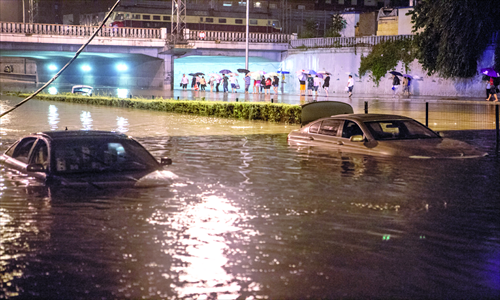Beijing downpour exposes holes in modernization drive

The heaviest downpour that hit Beijing in six decades flooded the city's main roads and killed 37 people over the weekend.
In recent years, floods caused by rain storms have repeatedly occurred in Chinese cities. And the latest downpour in Beijing has stirred up a new round of skepticism on the quality of infrastructure amid rapid urbanization.
The record precipitation did expose a coarse facet of Chinese modernization. There is an unofficial but interesting criterion in judging whether a city is developed or not: After three hours of rainfall, if you walk in the street and see slow but moving traffic, roads that are slippery but not swamped, then this is generally a developed place.
For a while, China was seen as entering the ranks of developed countries. However, Chinese cities are apparently unpracticed in facing disasters such as Saturday's torrential downpour. If so much chaos can be triggered in Beijing, the capital of the nation, problems in urban infrastructure of many other places can only be worse.
As Chinese experts point out, in terms of drainage technology, China is decades behind developed societies. Long-term planning and coordination are also lacking in constructing and maintaining cities' drainage systems. Legislation on urban drainage and sewage treatment only started in recent years and still needs to be improved.
It has been predicted that cities will be hit by similar disasters even more frequently, due to intensified "heat island" effect. We should not wait and spend huge resources to try and claim back losses only after a disaster takes place.
The disaster of Saturday was particularly unforgivable, given that Beijing's inadequate drainage system and emergency response mechanism were already exposed in the downpour on June 23, 2011.
Cities in developed countries have richer experience in disaster prevention and response. In some cases they even appear over-prepared - the massive evacuation before tropical storm Irene in New York City last summer was an example.
However, we will never be too cautious in facing natural disasters. On May 7, 2010, the rain storm in Guangzhou took six lives and led to economic losses of over 500 million yuan ($78 million). According to official statistics Sunday, the latest downpour in Beijing has already led to economic losses of nearly 10 billion yuan. We do not need more disasters to teach us the importance of disaster prevention.
Layers of disaster prevention work seem redundant in times of tranquility, but they are crucial systems that mean life or death when disaster hits.
Related report:
The heaviest rainstorms in 61 years hit the capital over the weekend, resulting in 37 deaths recorded as of 5 pm Sunday, authorities have announced.